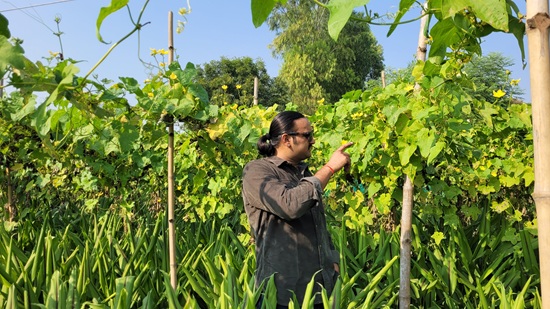Medicinal black turmeric crop debuts in Chandigarh, farmer leads sustainable farming effort; Watch Video
Harshabab Sidhu
Chandigarh, October 25, 2025 – For the first time in the Chandigarh region, black turmeric (Kali Haldi), a rare and highly medicinal variety of turmeric, is being cultivated by farmer Vyas at his farm in Khudda Alisher village. Vyas is growing the crop on 1.25 acres of land, marking a milestone for agricultural innovation in the area.
Black turmeric, recognized for its deep bluish-black rhizomes and distinctive aroma, is highly valued in Ayurveda for its potent antioxidant, anti-inflammatory, and immunity-boosting properties. Traditionally considered rare, it is sought after for various medicinal uses.

The crop thrives in loose, well-drained loamy soil enriched with organic matter and prefers a warm, humid tropical climate.
"Planting is usually done before the monsoon, around May or June, and harvesting happens after 8–9 months," Vyas explained. Regular but moderate watering is essential, as waterlogging can damage the rhizomes, and the crop benefits from partial shade — an advantage for multilayer farming systems.Vyas emphasizes that his black turmeric is grown strictly with organic manure and compost, avoiding chemical fertilizers to ensure maximum medicinal value and sustainability.
Harvest typically starts once leaves dry up, yielding 400–600 grams of fresh rhizomes per plant, depending on soil health and farming care.
Highlighting his approach, Vyas noted, "We focus on sustainability and biodiversity, using multilayer farming to maximize natural growth and preserve the purity of black turmeric."This pioneering effort brings a new avenue for organic and medicinal crop cultivation to the Chandigarh region, promising not only health benefits but also the potential for increased biodiversity and farm income